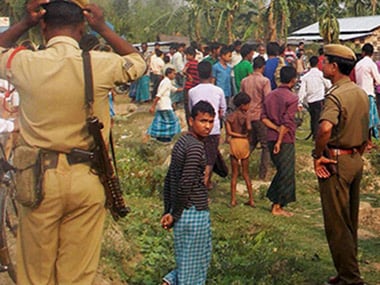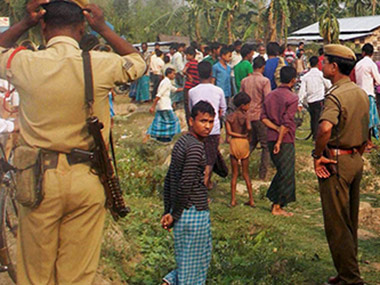“You are concerned about infiltrators and not your own people…they must go back, they are robbing the youth of India of their livelihood…” That was the Bharatiya Janata Party’s prime ministerial candidate
Narendra Modi in West Bengal on Sunday
, railing against illegal immigrants, a day after curfew had to be imposed in parts of neighbouring Assam, where attacks by Bodo militants had left 32 Muslims dead over the previous three days. [caption id=“attachment_1506775” align=“alignleft” width=“380”]
 PTI image[/caption] It appears that the detritus of a starkly polarised election season is collecting fast and thick, for how else do you explain the BJP’s instantaneous allegation of votebank politics when 32 people, including children as young as three or four years, had just died? Ditto for the Congress’s reaction: Curfew had not even been lifted when Minority Affairs Minister K Rahman Khan blamed Modi for creating instability in the state, having raised the Bangladeshi immigrant issue in a previous speech in Assam. “They always raise this issue during elections and victims are the poor Muslims in Assam,” Khan was reported to have said. The Congress was, of course, bumbling as usual – the Tarun Gogoi government could easily have anticipated trouble amid a tense election, not to mention that the region that has been highly sensitive after the forced migration of over 4,00,000 people following the Bodo-Muslim violence of 2012 hostilities and tensions have remained high after an attack by the National Democratic Front of Bodoland (Songbijit) earlier this year and following the reiterated demand for a separate state of Bodoland following the creation of Telangana. But the response of the PM-in-waiting was arguably more dangerous. The attacks on Muslim “settlers” in the districts of the BTAD (Bodoland Territorial Autonomous Districts)
are part of long-standing tensions between the communities there
. Post-independence, the tribal Bodos have witnessed clashes with the Adivasi tea tribes, the Muslim settlers and the Bengali Hindus. An active insurgency in the 1990s for separate statehood saw a
peace accord being signed in 2003
. But the accord failed to resolve key issues, including addressing crucial questions of development. Also, while the 2003 accord cleared the decks for the stting up of the BTAD, the Bodoland Territorial Autonomous Districts comprising Kokrajhar, Baksa, Chirang and Udalguri, and the Bodoland Territorial Council (BTC) that governs it, political power has slowly grown among the Muslims who now constitute the majority, with other non-Bodos. The BTC accord thus gave political power to a Scheduled Tribe group that was historically disadvantaged but simultaneously posited them against another disadvantaged group, the Muslims. And, while the Bodos obtained political power through the autonomy granted by a peace accord, it’s the Muslims who were perceived as having another kind of power, an opportunity to invoke some brand of majoritarian politics that could weaken the Bodos’ political autonomy. Certainly, immigration since the 1950s and continuing illegal immigration, are challenging issues for the region, but the BJP’s depiction of “infiltrators” or an especially spawned votebank from across the border is blind to the region’s socio-political realities and the demographics over the decades. Migration into Assam and West Bengal have their roots in the colonial period, in labour movements for jute production, among other things. To paint a simplistic picture of a Congress-supported “infiltration” is to deny an impoverished people their right to being seen in a historical context. The BJP’s, and Modi’s, lopsided view of the tragedy led to #DeportBAngladeshis trending on Twitter on Monday. Amid the melee,
West Bengal chief minister Mamata Banerjee jumped into the fray
, among Modi’s newest and loudest detractors now. She offered to “give shelter to the refugees” at an election rally on Sunday. West Bengal is the other state that has a substantial Bangladeshi population. On Twitter,
a news report
of a tribal girl’s alleged gangrape on March 29, over a month ago, was circulated as a possible trigger. Ironically, that report itself quoted a social activist in Kokrajhar as saying: “After the 2012 riots, the situation is still very sensitive in many areas and incidents such as this can trigger a flare-up with anti-socials taking advantage of the situation. The administration should act swiftly and take tough action against those guilty of such an inhuman act.” On Twitter, of course, there was place for neither nuance nor fact:
PTI image[/caption] It appears that the detritus of a starkly polarised election season is collecting fast and thick, for how else do you explain the BJP’s instantaneous allegation of votebank politics when 32 people, including children as young as three or four years, had just died? Ditto for the Congress’s reaction: Curfew had not even been lifted when Minority Affairs Minister K Rahman Khan blamed Modi for creating instability in the state, having raised the Bangladeshi immigrant issue in a previous speech in Assam. “They always raise this issue during elections and victims are the poor Muslims in Assam,” Khan was reported to have said. The Congress was, of course, bumbling as usual – the Tarun Gogoi government could easily have anticipated trouble amid a tense election, not to mention that the region that has been highly sensitive after the forced migration of over 4,00,000 people following the Bodo-Muslim violence of 2012 hostilities and tensions have remained high after an attack by the National Democratic Front of Bodoland (Songbijit) earlier this year and following the reiterated demand for a separate state of Bodoland following the creation of Telangana. But the response of the PM-in-waiting was arguably more dangerous. The attacks on Muslim “settlers” in the districts of the BTAD (Bodoland Territorial Autonomous Districts)
are part of long-standing tensions between the communities there
. Post-independence, the tribal Bodos have witnessed clashes with the Adivasi tea tribes, the Muslim settlers and the Bengali Hindus. An active insurgency in the 1990s for separate statehood saw a
peace accord being signed in 2003
. But the accord failed to resolve key issues, including addressing crucial questions of development. Also, while the 2003 accord cleared the decks for the stting up of the BTAD, the Bodoland Territorial Autonomous Districts comprising Kokrajhar, Baksa, Chirang and Udalguri, and the Bodoland Territorial Council (BTC) that governs it, political power has slowly grown among the Muslims who now constitute the majority, with other non-Bodos. The BTC accord thus gave political power to a Scheduled Tribe group that was historically disadvantaged but simultaneously posited them against another disadvantaged group, the Muslims. And, while the Bodos obtained political power through the autonomy granted by a peace accord, it’s the Muslims who were perceived as having another kind of power, an opportunity to invoke some brand of majoritarian politics that could weaken the Bodos’ political autonomy. Certainly, immigration since the 1950s and continuing illegal immigration, are challenging issues for the region, but the BJP’s depiction of “infiltrators” or an especially spawned votebank from across the border is blind to the region’s socio-political realities and the demographics over the decades. Migration into Assam and West Bengal have their roots in the colonial period, in labour movements for jute production, among other things. To paint a simplistic picture of a Congress-supported “infiltration” is to deny an impoverished people their right to being seen in a historical context. The BJP’s, and Modi’s, lopsided view of the tragedy led to #DeportBAngladeshis trending on Twitter on Monday. Amid the melee,
West Bengal chief minister Mamata Banerjee jumped into the fray
, among Modi’s newest and loudest detractors now. She offered to “give shelter to the refugees” at an election rally on Sunday. West Bengal is the other state that has a substantial Bangladeshi population. On Twitter,
a news report
of a tribal girl’s alleged gangrape on March 29, over a month ago, was circulated as a possible trigger. Ironically, that report itself quoted a social activist in Kokrajhar as saying: “After the 2012 riots, the situation is still very sensitive in many areas and incidents such as this can trigger a flare-up with anti-socials taking advantage of the situation. The administration should act swiftly and take tough action against those guilty of such an inhuman act.” On Twitter, of course, there was place for neither nuance nor fact:
If anybody has raised relevant questions about the adequacy of the Centre’s move to respond to statehood demands of ethnic people with so-called autonomous councils and study groups, these have been drowned out. If the debate on a knotty issue in one of India’s most complex regions has been reduced to a hashtag, we have an election’s severely polarised polity to blame.
)